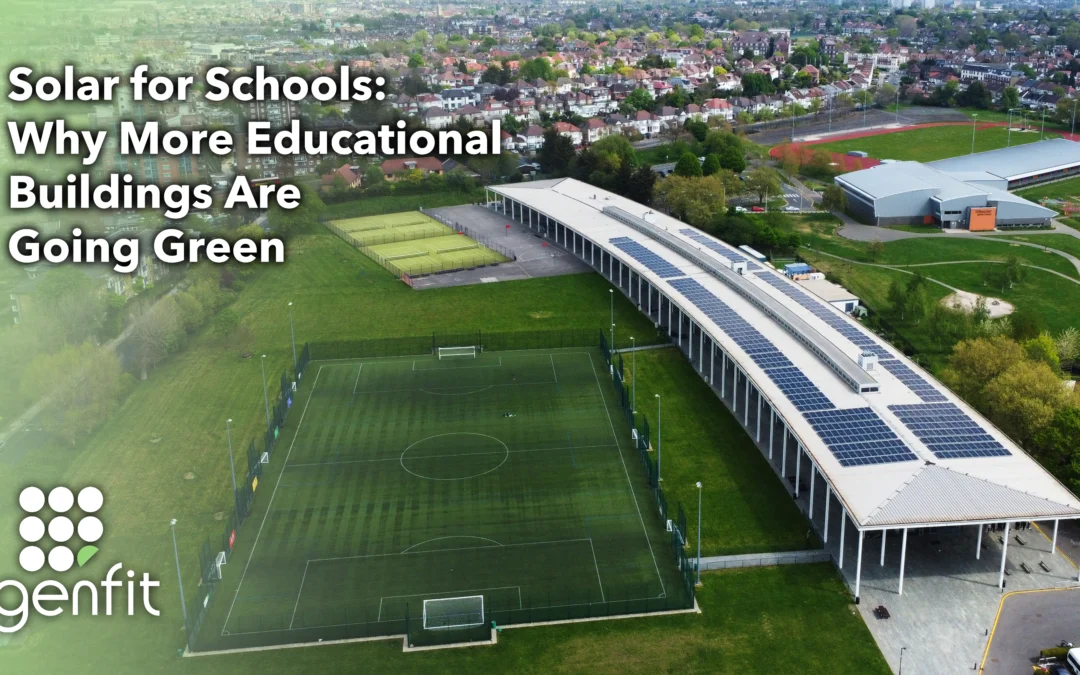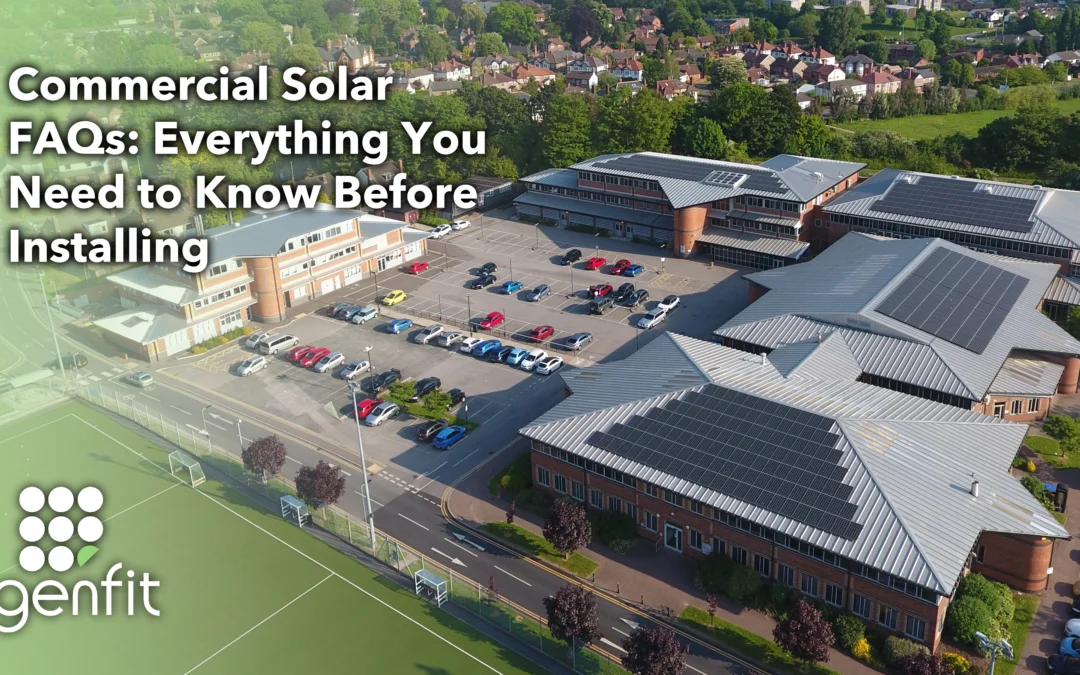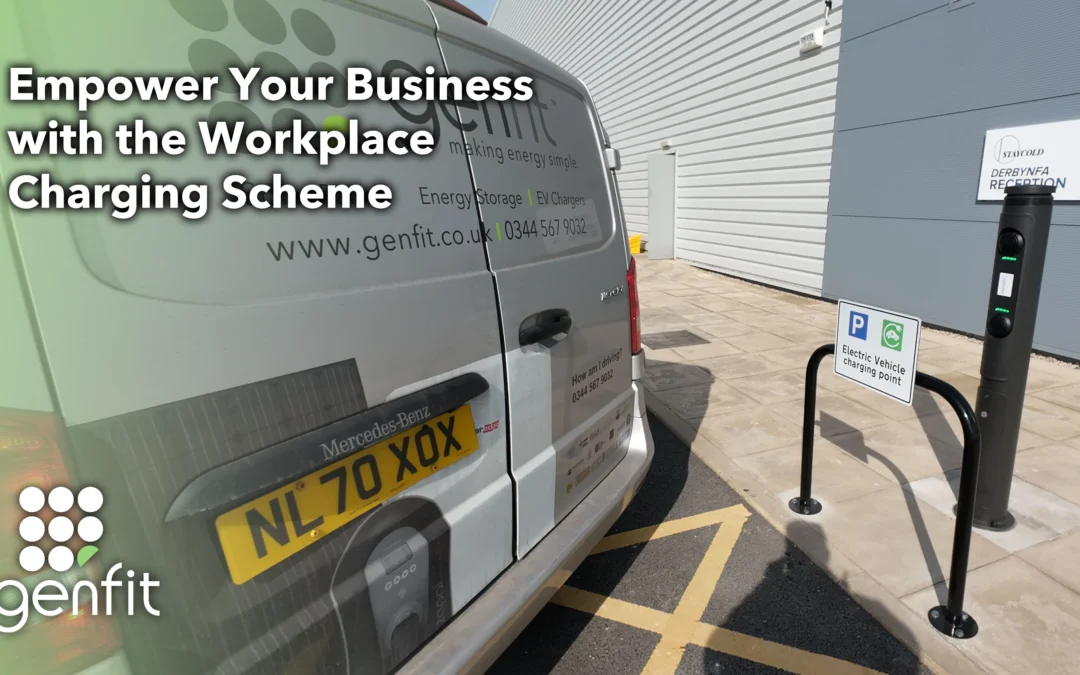
Schools across the UK are under pressure to reduce costs, cut carbon emissions, and lead by example when it comes to sustainability. More than ever, solar PV is emerging as a practical and impactful solution — and at Genfit, we’re seeing a big rise in educational buildings making the switch to solar energy.
In this blog, we explore why solar for schools is growing in popularity, the benefits it brings, and how it works in practice.
1. Why Are Schools Going Solar?
Schools typically have large roof spaces and high daytime energy usage, which makes them ideal for solar PV. With rising energy bills and tighter budgets, solar can offer serious savings — plus it’s a visible commitment to sustainability that benefits students and staff alike.
2. The Key Benefits of Solar for Schools
✅ Lower Energy Bills
Solar panels help reduce dependency on the grid, lowering electricity costs year after year. Many schools can save thousands annually — money that can be reinvested into teaching, facilities, or student support.
✅ Reduce Carbon Emissions
Solar power is clean and renewable. Installing panels helps schools meet environmental targets and become more eco-conscious institutions.
✅ Educational Value
A solar installation can become a real-life teaching tool. Pupils can learn about energy, climate change, and sustainability in a hands-on way — especially if the school uses live performance data in the classroom.
✅ Long-Term Value
Once installed, solar panels typically last 25+ years and require very little maintenance. Schools can benefit from long-term savings and improved energy resilience.
3. Funding Solar in the Education Sector
While some schools fund solar installations outright, others work with community energy groups, councils, or apply for grants. Genfit has worked with several schools and trusts who’ve secured funding through innovative routes, helping them go solar with minimal upfront costs.
4. Real Examples: Solar in Action
At Genfit, we’ve completed installations at primary and secondary schools across the UK — from newly built campuses to historic schools retrofitting solar for the first time.
In one project, we installed a solar PV system on a school still under construction, helping it open as a future-ready, low-carbon building from day one. In another, a community energy partnership made it possible for a local school to generate clean energy and lower its carbon footprint without using its own budget.
5. Getting Started: Is Solar Right for Your School?
If your school or trust is exploring energy efficiency, solar is worth serious consideration. Our team can provide a free feasibility assessment to help you understand:
- Roof suitability
- Estimated annual savings
- CO₂ reductions
- Payback period
- Funding options
Final Word:
Solar panels aren’t just a green option — they’re a smart one. For schools, the benefits go well beyond saving money: it’s about investing in the next generation and making sustainability part of everyday learning.
Ready to Explore Solar for Your School?
Genfit has years of experience working with schools and education trusts across the UK. Get in touch to arrange a free site survey or to ask us any questions.

As the solar industry advances, ensuring high performance, safety and cybersecurity in PV systems has become more crucial than ever. A new independent report by VDE Renewables – a global authority on renewable energy testing and certification – has validated SolarEdge’s position as a market leader in delivering all three.
At Genfit, we’re proud to install SolarEdge inverter and Power Optimizer systems, and this latest study further strengthens our confidence in offering these high-performing, secure and future-proof technologies to our customers.
✅ Industry-Leading Safety Standards
VDE Renewables’ assessment highlights how SolarEdge’s MLPE (Module-Level Power Electronics) technology exceeds international safety standards. The system’s integrated protection mechanisms – including SafeDC™, rapid shutdown, module-level monitoring, and Sense Connect – significantly reduce fire risk and electrical hazards.
Sense Connect, in particular, proactively identifies overheating connectors long before they become a danger, helping to prevent thermal events and offering critical peace of mind to system owners, emergency responders, and maintenance teams.
🔒 Robust Cybersecurity Protection
Cybersecurity is an emerging concern in increasingly digitised and connected solar systems. SolarEdge’s built-in cybersecurity architecture was found to comply with international standards such as IEC 62443, ISO/IEC 27001, and the NIST Cybersecurity Framework.
The report recognised SolarEdge’s commitment to grid resilience with features including:
- Encrypted communication protocols
- Secure remote firmware updates
- Multi-level access control
- Continuous system monitoring
- Penetration-tested system design
As solar systems become more integrated into national infrastructure, protecting them from cyber threats is no longer optional – it’s essential.
⚡ Proven Higher Energy Yields
Performance testing within the VDE study showed that SolarEdge systems deliver significantly more energy than traditional string inverters:
- 4% more energy on simple rooftops
- 10.5% more energy on complex rooftops
These impressive gains are driven by SolarEdge’s Power Optimizers and advanced Buck and Boost technology, which allow each panel to operate independently at its maximum efficiency. The SolarEdge ONE platform further enhances performance by adapting to fixed and dynamic electricity tariffs, supporting larger systems, and reducing Balance of System (BoS) costs.
Trusted Technology for the Future
Arne Gruenewald from VDE Renewables commented, “SolarEdge’s technology demonstrates its strategic market position in safety, cybersecurity, and performance – criteria that are essential for the technology’s long-term viability and trust.”
At Genfit, we’re committed to delivering only the best technology to our customers, and that’s why SolarEdge continues to be a key part of our offering. Whether you’re installing solar for your home or business, you can rest assured you’re investing in a system that’s smart, secure, and built to deliver more energy for years to come.
Want to see how SolarEdge can maximise your savings and minimise risk?
Contact Genfit today to get started.

For many businesses, ESG (Environmental, Social and Governance) targets and Net Zero goals are no longer just a ‘nice to have’, they’re becoming part of day-to-day decision-making, supply chain expectations, and stakeholder accountability.
But reaching those goals doesn’t have to be complex. One of the most direct, proven ways to cut carbon and demonstrate environmental action is by installing solar panels.
Here’s how solar power can help your business hit its ESG and Net Zero targets, and deliver long-term value at the same time.
✅ Environmental Impact: Cut Your Carbon Footprint at Source
Generating your own electricity with solar means you’re reducing your reliance on grid power, which often comes from fossil fuels. A well-designed solar system can significantly lower your carbon emissions from energy use — one of the key contributors to a business’s overall environmental impact.
Whether you’re reporting on carbon reductions for ESG or working toward a formal Net Zero commitment, solar helps you take measurable, trackable action.
💰 Financial Savings That Support Long-Term Sustainability
It’s not just about carbon, solar also reduces operating costs. Lower energy bills = more room to invest in other sustainability initiatives, or simply protect your bottom line in the face of rising electricity prices.
And thanks to improved technology and falling costs, the payback period for commercial solar is now often under 7 years, with decades of clean energy to follow.
📊 ESG Reporting: Show Real Progress, Not Just Promises
Solar installations provide tangible data, kilowatt-hours generated, CO2 saved, which you can use in ESG reports, sustainability statements, and stakeholder updates.
Whether you’re aiming to meet internal goals, qualify for procurement frameworks, or appeal to eco-conscious customers, solar gives you something real to point to.
🌍 Supporting Broader Social & Environmental Goals
If you’re a school, local authority, or community organisation, going solar also sets an example. It’s a visible sign of leadership on climate action and can be used to educate, inspire, or influence others, from pupils and staff to the wider public.
Even in the private sector, solar can boost your brand’s reputation and align with growing customer expectations around environmental responsibility.
🏢 Future-Proofing Your Business
Energy security is becoming a key part of sustainable business planning. Solar (especially when combined with battery storage) makes your site more resilient and self-sufficient, reducing exposure to market volatility and supply chain risks.
It’s a smart move, both for the planet and for long-term business stability.
Real Impact. No Greenwashing.
At Genfit, we work with organisations that are serious about doing things the right way. No greenwashing, no gimmicks, just well-designed solar systems that help you make meaningful progress on ESG and Net Zero goals.
Let’s Talk
Whether you’re just starting out with ESG or you’re already on the road to Net Zero, we’re here to help you explore what solar could do for your business.
📞 Call us on 0344 567 9032
🌐 Or visit www.genfit.co.uk to book a free consultation.

As energy bills continue to climb and the UK pushes toward a net-zero future, solar panels are becoming a smart and sustainable investment for homeowners and businesses alike. But one of the most common questions we hear at Genfit is: “How much money will I actually save?”
In this blog, we’ll break down the real financial benefits of installing solar panels in 2025, including payback periods, typical savings, and how things like energy usage, battery storage, and smart export schemes affect your return.
1. How Much Can You Save with Solar Panels in 2025?
The average UK household can save £400 to £800 per year on electricity bills with a well-sized solar PV system. These figures can be higher for homes with larger systems, high daytime energy use, or battery storage.
For businesses, savings are even more significant, often ranging from £1,500 to £10,000+ annually, depending on site size and energy demand.
2. What’s the Payback Period in 2025?
Payback is how long it takes for the savings on your energy bills to cover the cost of the system.
- Domestic installs: Typically 6–10 years
- Commercial installs: Often 4–8 years due to higher usage and VAT/tax benefits
After that, it’s pure savings, and with solar panels lasting 25 years or more, the long-term return is substantial.
3. What Factors Affect How Much You Save?
- System size: Bigger systems generate more energy — but need more roof space.
- Your energy use: The more you use during daylight hours, the more you save.
- Battery storage: Adds cost upfront but increases your self-consumption and savings.
- Export schemes: You can earn money back by exporting excess energy through Smart Export Guarantee (SEG) tariffs.
- Tariff rates: If energy prices continue rising, your savings rise too.
4. Case Example: Typical 4kW System for a Family Home
- Installation cost: ~£6,000
- Annual savings: ~£600
- Payback time: ~10 years
- Total lifetime savings: Over £10,000
With a battery added, you might stretch the budget, but you increase your energy independence and reduce reliance on the grid.
5. Final Thought: Solar is an Investment, Not Just an Upgrade
When you install solar panels, you’re locking in long-term energy savings and protecting yourself from future price rises. In 2025, with the UK’s energy landscape shifting fast, the return on solar has never looked better.
Thinking About Going Solar?
Get in touch with the Genfit team today for a no-obligation quote and a clear breakdown of what solar could save you.

Thinking about solar for your business? You’re not alone. With rising energy costs and growing pressure to meet sustainability targets, more and more commercial sites are making the switch to solar.
But before you dive in, it’s natural to have questions. At Genfit, we speak with organisations of all sizes — from schools and offices to warehouses and manufacturers — and many of the same questions come up time and again.
Here’s a round-up of the most common commercial solar FAQs we hear, answered clearly and simply.
1. Is solar right for my business?
If your site has a decent-sized roof or land space with good sun exposure, and you’re using electricity during the day, then the chances are yes. Solar is ideal for offices, schools, warehouses, factories and more.
It’s also a long-term investment — reducing bills, lowering carbon emissions, and future-proofing your energy supply.
2. How much does a commercial solar system cost?
There’s no one-size-fits-all price. The cost depends on the system size, the type of equipment used, your roof structure, and access.
At Genfit, we provide detailed, transparent quotes — with no hidden extras — so you can see exactly what’s included and understand your return on investment from the start.
3. What size system do I need?
This depends on your energy usage, available roof space, and future plans (e.g., EV charging, battery storage). A proper site survey and energy analysis is key.
We design systems that fit your energy profile, not just your roof.
4. Will solar really save my business money?
Yes — especially if you use a lot of electricity during the day. Solar reduces the amount of electricity you need to buy from the grid, protecting your business from price hikes.
Most commercial systems pay for themselves in 4–7 years and continue generating free electricity for decades.
5. What kind of maintenance is involved?
Solar PV systems are generally low maintenance, with no moving parts. We recommend annual system checks and occasional panel cleaning to keep things running efficiently. We can take care of this for you.
6. Will it disrupt business operations during installation?
We keep disruption to a minimum. Our commercial install team works around your schedule and takes health and safety seriously. Most installations are completed within a few days to a few weeks depending on the project size.
7. What’s included in a Genfit installation?
We don’t believe in hidden extras. Our commercial quotes include:
- High-quality panels and inverters
- Full system design and DNO application
- Monitoring setup
- All electrical works and installation
- Handover documentation and support
8. What’s the next step?
If you’re considering solar for your site, the next step is a no-obligation chat with our team. We’ll discuss your needs, take a look at your energy usage, and provide a clear quote and system design.
Ready to explore solar for your business?
We’ve delivered trusted installations for schools, offices, industrial buildings and more across the UK. Whether you’re looking to cut costs, reduce carbon, or both — we’re here to help.
📞 Call us on 0344 567 9032
🌐 Or visit www.genfit.co.uk to get started.

As the shift towards electric vehicles (EVs) gathers pace, businesses across the UK have a great opportunity to support sustainability while improving their operations. The Government’s Workplace Charging Scheme (WCS) offers financial support to organisations looking to install EV charge points – and Genfit is here to take care of the full installation for you.
What is the Workplace Charging Scheme?
The Workplace Charging Scheme is a government initiative designed to encourage the uptake of electric vehicles by subsidising the cost of installing charge points at workplaces.
Eligible organisations can receive up to 75% off the cost of purchase and installation – capped at £350 per socket – for up to 40 sockets across all their sites. That means you could claim up to £14,000 in total.
View the official scheme details here.
Who Can Apply?
To qualify, your organisation must:
- Be a registered business, charity or public sector organisation
- Be located in England, Wales, Scotland or Northern Ireland
- Have dedicated off-street parking for staff or fleet vehicles
- Own the property or have permission from the landlord
- Use an authorised installer (Genfit is OZEV-approved)
You don’t need to already have electric vehicles in use – just a plan to support EV adoption.
How Genfit Can Help
We make the process simple from start to finish. As an OZEV-authorised installer, Genfit can ensure your installation is compliant with the scheme’s requirements – and that you receive the full funding you’re entitled to.
Here’s what we offer:
- Site assessment – we’ll visit your premises to assess the best set-up
- Support with your application – we’ll help you navigate the WCS grant process
- Professional installation – by our experienced, fully qualified team
- Aftercare and maintenance – to keep your system running smoothly
Why Choose Genfit?
With over a decade of experience in the renewable energy sector, Genfit provides expert solutions for businesses looking to reduce their carbon footprint.
We’re a Certified B Corporation, which means we meet the highest standards of social and environmental performance, transparency, and accountability.
From solar PV and battery storage to EV charging – we’re committed to helping organisations across the UK make the switch to clean energy.
Ready to Get Started?
Installing EV chargers at your workplace is a smart step for your business, your employees, and the planet. With funding available through the WCS and Genfit handling the entire process, now’s the perfect time to act.
📞 Call us: 01244 955 488
📧 Email: info@genfit.co.uk
Or visit our contact page to get in touch.
Let’s take the next step towards a more sustainable future – together.






